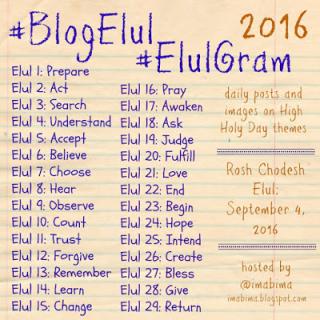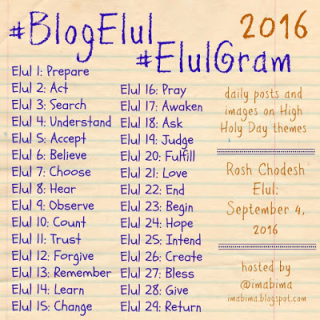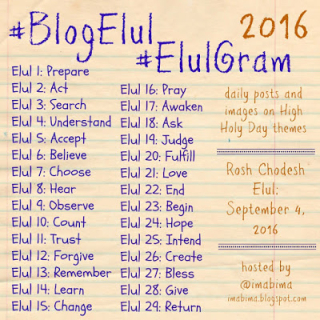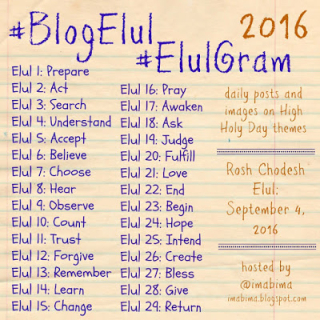Rachel Barenblat's Blog, page 99
September 23, 2016
#blogElul 20: Fulfill
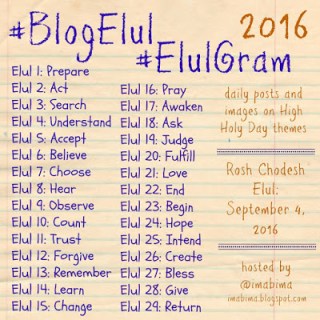 When it comes to you, dearest one,
When it comes to you, dearest one,
I am profligate with promises:
I will remember you everywhere
I will open my eyes to you always
the channel between your heart and mine
will always be open, even when I ache
because you are too far away
or because my words fail me.
I wish I could adorn you with stars
but all I have are sparks
glinting between my cupped hands
cast by the tireless fire of my heart.
I'm participating again this year in #blogElul, an internet-wide carnival of themed posts aimed at waking the heart and soul before the Days of Awe. (Organized by Ima Bima.) Read #blogElul posts via the Elul tag; you might also enjoy my collection of Elul poems which arose out of #blogElul a few years ago, now available in print and e-book form as See Me: Elul poems.

September 22, 2016
#blogElul 19: Judge
Your Honor, I don't need to tell you
where I've fallen short: you've seen
the times when I chose silence because
I couldn't bear to stand up for myself...
No one would blame you if you told me
I'm not worth rehabilitating, not after
all these years of ignoring my needs
and pretending I didn't hear your voice.
I lift my gaze to yours expecting lightning
but instead I get the hazel waters
of my childhood river, warm and gentle.
You don't fault me the time it took.
You tell me I wasn't put here only
to weep. You wipe my brimming eyes.
I'm participating again this year in #blogElul, an internet-wide carnival of themed posts aimed at waking the heart and soul before the Days of Awe. (Organized by Ima Bima.) Read #blogElul posts via the Elul tag; you might also enjoy my collection of Elul poems which arose out of #blogElul a few years ago, now available in print and e-book form as See Me: Elul poems.

September 21, 2016
My latest for The Wisdom Daily: on readiness
...No matter what I do, I can’t truly be ready to stand before God on Rosh Hashanah and face my own autobiography. I can’t truly be ready to stand before God on Yom Kippur and make complete teshuvah, re/turn myself in the right direction again and relinquish my attachments to my mistakes and my old stories. Here’s the kicker: since I can’t be ready, I have to do it anyway.
This is true with every big life transition: changing career, moving house, marriage, divorce. Even when we think we know what we’re getting into, the truth is that we can never fully know. Even when we think we know who we’re marrying, or why we’re ending a marriage. Even when we do everything we can to prepare for change, we can’t be wholly ready when the change comes....
That's from my latest at The Wisdom Daily: You'll never be ready to grow.

#blogElul 18: Ask
Did you know all along that this is where I would be:
sitting on a secondhand couch in a half-darkened room
with laptop and glass of a crisp Oregon Pinot Gris
writing poems after singing the kid's bedtime songs
and closing his door behind me? Did you know a year ago
as the new moon approached that I was steeling myself
to admit unhappiness I'd never been able to speak?
Did you know I wouldn't be renewing those vows again --
instead I'd be disentangling from the fine knotted threads
of the household, of the narrative, of the future I used
to think was a given? Did you know, and if I'd been able
somehow to hear the words would you have told me then
that I would be here now, buffeted sometimes by grief
but able to trust that the tempests will someday recede,
that I will find my way to calm waters, to a new shore?
I'm participating again this year in #blogElul, an internet-wide carnival of themed posts aimed at waking the heart and soul before the Days of Awe. (Organized by Ima Bima.) Read #blogElul posts via the Elul tag; you might also enjoy my collection of Elul poems which arose out of #blogElul a few years ago, now available in print and e-book form as See Me: Elul poems.

September 20, 2016
#blogElul 17: Awaken
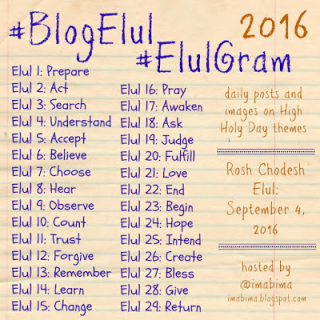 Every day you
Every day you
open my eyes
to my choices
and my flaws.
You wake me
to my strength,
to the earth
beneath my feet.
You wake me
to the places
where I've failed
to remember you
not to shame
but to spark
my heart's yearning
to do better.
Wake me up
in every moment.
Don't let me
fall back asleep.
I'm participating again this year in #blogElul, an internet-wide carnival of themed posts aimed at waking the heart and soul before the Days of Awe. (Organized by Ima Bima.) Read #blogElul posts via the Elul tag; you might also enjoy my collection of Elul poems which arose out of #blogElul a few years ago, now available in print and e-book form as See Me: Elul poems.

September 19, 2016
#blogElul 16: Pray
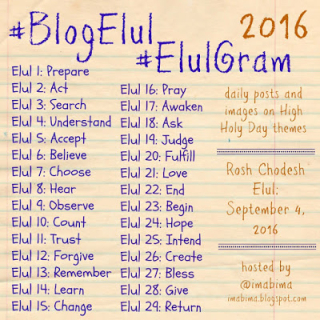 You are the first thought I want
You are the first thought I want
to have. Are you there this morning?
Can I sense you? Have I thanked you
yet today for the melody that twined
through my dreaming, the one
that sounded the way tzitzit feel
when I remember how it feels to wind
the strands of white with blue?
As the pages of my morning turn
I look for you on every one, and for
myself in every line I write to you.
Am I someone you would be proud of
right now, given what I've just done?
And how about now, unloading dishes
while my son asks again if he can eat
in front of the television? And now,
reeling with unanticipated joy, or grief?
Thank you for seeing me even when
no one else does, and in seeing me
reminding me that I am cherished
even when I feel most alone.
I'm participating again this year in #blogElul, an internet-wide carnival of themed posts aimed at waking the heart and soul before the Days of Awe. (Organized by Ima Bima.) Read #blogElul posts via the Elul tag; you might also enjoy my collection of Elul poems which arose out of #blogElul a few years ago, now available in print and e-book form as See Me: Elul poems.

September 18, 2016
A ritual for ending a marriage
When a Jewish marriage has ended, there is an act that brings closure to the marriage -- the granting of a גט / a "get," a legal document of release. (Here's some basic information about how that usually works.) What follows here is a ritual intended for that purpose. I wrote it for my own divorce. It was important to me that we release each other, emotionally and spiritually, before the Days of Awe usher in the Jewish new year.
In the most traditional paradigm, the husband grants a get to the wife. In this ritual, the granting of the get is bilateral -- each of the divorcing parties writes out a document of release and gives it to the other. Also, in this ritual the get is written in the vernacular, rather than in Aramaic. In theory a get can be written in any language, but in practice most are in Aramaic. (You can read a translation of a standard get at this page about Jewish divorce.) My choice to use the vernacular follows on the custom of התרת נדרים / "hatarat nedarim," the pre-Rosh-Hashanah "untangling of vows," which is done in the vernacular to ensure that the person seeking release knows what they're saying.
I've been working on this ritual off and on for several months. We used it this morning: on Tu b'Elul, the midway point in the month of Elul, the last full moon of 5776. The Jack Gilbert poem at the beginning of the ritual is one of my favorites -- I met him many years ago, and he was tremendous -- though in part because it speaks in the voice of a partner grieving the departure of a wife, I would not have presumed to include it on my own. But Ethan brought it to me and asked whether I would be open to him reading it as part of the ritual, and I was glad to agree.
I'm still processing the experience of doing the ritual, and will probably write more about that at a later date, but for now I wanted to share the ritual here in case it is helpful to anyone else. That said, if you are ending a Jewish marriage, please consult with a trustworthy rabbi to ensure that your get is valid.
1. Opening
Witness:
A marriage that has ended is like the first set of tablets and the covenant they represented. They were given in love, but then they shattered. Still, Torah teaches that we carried them thereafter in the ark along with the second set of tablets which remained whole. As the two of you move into a new chapter of your lives, you carry with you hopes for new wholeness -- and you also carry the broken pieces of your marriage, which are also holy.
At your wedding you vowed to betroth yourselves to each other in righteousness, in lovingkindness, and in compassion. May those same qualities be present as you disentangle your lives and separate from one another.
As we open this ritual, a poem from Jack Gilbert of blessed memory:
Failing and Flying
Everyone forgets that Icarus also flew.
It’s the same when love comes to an end,
or the marriage fails and people say
they knew it was a mistake, that everybody
said it would never work. That she was
old enough to know better. But anything
worth doing is worth doing badly.
Like being there by that summer ocean
on the other side of the island while
love was fading out of her, the stars
burning so extravagantly those nights that
anyone could tell you they would never last.
Every morning she was asleep in my bed
like a visitation, the gentleness in her
like antelope standing in the dawn mist.
Each afternoon I watched her coming back
through the hot stony field after swimming,
the sea light behind her and the huge sky
on the other side of that. Listened to her
while we ate lunch. How can they say
the marriage failed? Like the people who
came back from Provence (when it was Provence)
and said it was pretty but the food was greasy.
I believe Icarus was not failing as he fell,
but just coming to the end of his triumph.
Jack Gilbert, 1925 - 2012
2. The separate cup
Witness:
Beneath the chuppah you drank from a single cup, representing the shared cup of your life together. I pour wine now from that single cup into two glasses. Please join with me in blessing this wine, which you will sip each from your own cup, as you drink from your own cup of life henceforth.
ברוך אתה יי אלהינו מלך העולם ברי פרי הגפן.
Baruch atah Adonai, eloheinu melech ha'olam, borei pri hagafen.
A Fountain of Blessing are You, Adonai our God, sovereign of all space and time, creator of the fruit of the vine.
3. Prayer of forgiveness
The divorcing couple speaks these words, either in turn or simultaneously:
Eternal Friend, witness that I forgive [Name]
for any injuries sustained over the course of our relationship
whether by accident or willfully, carelessly or purposely
with words, deeds, thought, or attitudes
now or in previous incarnations.
May s/he not experience harm because of me.
May the words of my mouth and the meditations of my heart
be acceptable to You, Who protects and frees me.
4. New beginning
Witness:
Every ending is a new beginning. Although these two are no longer married in the eyes of God or the Jewish community, they will always be co-parents to their child. I invite them now to share promises they make to each other as co-parents.
The former partners read, taking turns:
I promise to keep our child's needs at the forefront.
I promise never to speak ill of you to our child.
I promise to maintain good boundaries as we co-parent from separate households.
For the sake of our child, I promise to be as generous and flexible as life will permit.
I promise to join you in revisiting our custody arrangements every few years, so that we can adapt our practices to meet the changing needs of our growing child.
I promise to do everything in my power to maintain a friendly relationship with you so that we can share in our child's joys and sorrows.
5. Writing the release
Each partner copies the following text in silence:
On the X day of the week, the Y day of the month of [Month] in the year 5776 from the creation of the world (equivalent to the secular date of [secular day, month, year]), here in [Place], near to the [name of the nearest river], I, [English name], also known as [Hebrew or any other name], do willingly consent to release you, my wife / husband [English name], also known as [Hebrew or any other name].
We are no longer bound together. If you so choose, you may remarry freely. Your doorway is no longer my doorway. Wherever life takes you, may you go in peace.
This is a bill of divorce, written in alignment with customs of Moses, Miriam, and the Jewish people.
Each document is signed by the person who wrote it and by the court of three witnesses.
6. The cut
Witness:
(making a cut in each document)
As my scissors cut into the heart of this document, divorce cuts deeply into the heart of those who are divorcing. Your hearts have already been torn. May receipt of this document help you heal.
Each partner places the paper they wrote, now signed and cut, into the cupped hands of the other. The partners turn away from each other and take three steps away from each other, signifying the beginning of the new life journey each will take alone.
7. Closing
Witness:
At the end of your wedding you shattered a glass, a reminder that in every joyous occasion there is some sorrow. Now that your marriage has broken like that glass, may you find that even in this sorrowful occasion there is access to joy.
Now go forth in peace, to life.
Notes:
The idea that a marriage that has ended is like the broken tablets comes from Rabbi Leana Moritt, from Ritual Possibilities Within Traditional Gittin In a Pluralistic / Post Denominational Setting, 2008.
The prayer of forgiveness is adapted from Rabbi Zalman Schachter-Shalomi z"l's translation of the bedtime prayer of forgiveness, part of the Bedtime Shema.
The phrase "Your doorway is no longer my doorway" comes from Rabbi Goldie Milgram.
Regarding the cut in the document: "Be sure to explain that the cut does not sever the document in two. Rather, it cuts into the heart of the document just as divorce cuts deeply into the heart of those who are divorcing." (Per Rabbi Pam Frydman.)
Related: Immersion, April 2016.

#blogElul 15: Change
When the ground beneath my feet shifts like sand
when I wake to unfamiliar views out foreign windows
when the stories I once told about how my life would be
unravel like a sweater whose loose thread is pulled
when my thumb reaches again and again for my index finger
making sure the rings are still there and then I remember
when I tell yet another acquaintance how much has changed
and then comfort them because it's more than they can bear
the constant I know I can count on is you, tucked
inside the innermost chamber of my storm-tossed heart
and because love is a mobius strip with no beginning or end
you carry me safe and cherished even as I carry you
I'm participating again this year in #blogElul, an internet-wide carnival of themed posts aimed at waking the heart and soul before the Days of Awe. (Organized by Ima Bima.) Read #blogElul posts via the Elul tag; you might also enjoy my collection of Elul poems which arose out of #blogElul a few years ago, now available in print and e-book form as See Me: Elul poems.

September 17, 2016
#blogElul 14: Learn
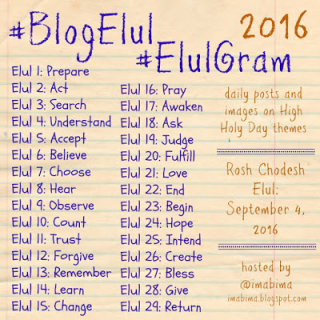 How to feel you with me
How to feel you with me
hand on my shoulderblade
song in my ear
how to share with you
the surprise of wild mint,
the blue of September sky
how to let summer slip
through my fingers
without grieving its passing
how to trust
you'll be here with me
even when the days grow dark
I'm participating again this year in #blogElul, an internet-wide carnival of themed posts aimed at waking the heart and soul before the Days of Awe. (Organized by Ima Bima.) Read #blogElul posts via the Elul tag; you might also enjoy my collection of Elul poems which arose out of #blogElul a few years ago, now available in print and e-book form as See Me: Elul poems.

September 16, 2016
#blogElul 13: Remember
I know there was a moment when everything changed.
When I opened a door and became aware of you.
Since then you hover at the edge of my awareness
like sunlight warming my face, like cinnamon
or etrog peel spicing my senses. What I can't recall
is how it felt to be blind to you, and to hide
even from myself the fact that I was ignoring
love's rhythmic knock on the door of my heart.
How did I not notice I was going through the day
with one eye closed, with half of my self
tied behind my back? Now that I'm awake, I promise
I won't ever choose to go back to sleep.
I'm participating again this year in #blogElul, an internet-wide carnival of themed posts aimed at waking the heart and soul before the Days of Awe. (Organized by Ima Bima.) Read #blogElul posts via the Elul tag; you might also enjoy my collection of Elul poems which arose out of #blogElul a few years ago, now available in print and e-book form as See Me: Elul poems.

Rachel Barenblat's Blog
- Rachel Barenblat's profile
- 6 followers


